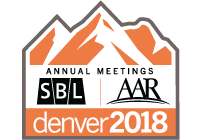Theology Without Walls Panels
AAR 2018 National Meeting : Denver, colorado November 17 - 20
M17-300 - Theology Without Walls Group
Join us for a free-for-all discussion with opening comments aimed at helping scholars in process. All are invited who are interested in comparative theology, theology of religions, systematic theology, and American religion.
.
M17-402 - Theology Without Walls Group
Join us for a discussion of future panels and other projects of the Theology Without Walls group. All are invited who are interested in comparative theology, theology of religions, systematic theology, and American religion.
Panelists:
M19-101 - Theology Without Walls Group
Theology Without Walls proposes that, first, theology – take into account all genuine epiphanies wherever they can be found and, second, confessions not limit what epiphanies can be into account or require that such epiphanies be re-conceptualized to fit its theology. Do those proposals make TWW incompatible with confession-based theology? Or, given the protean character of religious traditions, might existing confessions have sufficient plasticity to accommodate unfamiliar truths? Instead of spiritual epiphanies being judge by conformity to one’s confession, should one’s confession be judged by its ability to give adequate expression to the full range of spiritual truths? This panel will explore both the conflicts and the synergy between confessional and transreligious theologizing and address issues in comparative theology, Hindu-Christian theology, and systematic theology.
.
.
.
.
M19-200 - Theology Without Walls Group
Does theology require a religious home and identity, or can it be a free-ranging inquiry into the divine/ultimate reality? Is multiple religious identity possible and, if so, how does one theologize from that standpoint? Is drawing on multiple religious influences inevitably superficial? Can the Spiritual But Not Religious theologize or think rigorously about the divine reality and, if so, how might they best go about that? This panel will address issues in comparative theology, theology of religions, spiritual experience, and American religion.
.
.
.
